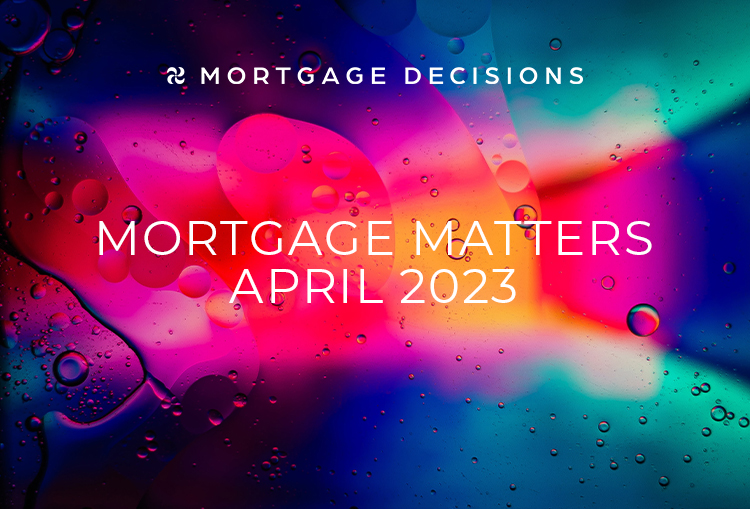- Mortgages
Mortgages
Bad Credit Mortgages
- Shared Ownership
- Insurance
Insurance
Life Insurance for Families
Life Insurance for Seniors
- Specialist lending
- About
- Events

The mortgage market in context of the UK economy
The period of uncertainty following the shock of the mini-budget is easing, and confidence in the housing market is increasing. Inflation remains stubbornly high and the current Bank Rate is 4.25%, its highest level since 2008. Despite this, mortgage rates are continuing to fall, with the average cost of a five-year fixed-rate mortgage falling by 0.23% since October, in spite of the Bank Rate increasing by 2% during the same period (Zoopla).
Albeit still negative, UK consumer confidence increased 6 points in April, the third consecutive month that confidence overall has improved (GfK), with buyers increasingly accepting they are in a new lending landscape. Sales activity has been solid, supported by a strong jobs market, savings accumulated during the pandemic and strong levels of housing equity. Lenders seem increasingly confident in the market, with far more high loan-to-value mortgages available, and lender competition strongest in loan-to-value ranges of 85% and 90%, popular with first-time buyers (Rightmove). The next two years will be a critical period. However, the general consensus is that rates will drop further, supported by good swap rates.
Driven by record rents, first-time buyers (FTBs) are highly active in the housing market, with smaller properties (up to two bedrooms) in high demand. FTB property prices reached an all-time high of £224,963 in April (Rightmove). Those who can clear the mortgage and deposit obstacles can capitalise on the lower mortgage rates in recent weeks, with lenders being willing to lend at higher loan-to-values. The average FTB mortgage rate for a 5-year fixed, 15% deposit mortgage has now fallen to 4.46%, with the lowest rate for this type of mortgage currently at 4.19% (Rightmove). Fierce competition between lenders means an increasing number and variety of deals are emerging, indicating more confidence in the future market. At the start of April there were 5,146 residential mortgage deals on the market, an increase from 4,372 at the start of last month, and approaching the 5,300 in December 2021, before interest rates began to increase (Moneyfacts). Lenders are more flexible than in recent times, with products in affordable markets (such as shared ownership) and green products booming.
An estimated 1.7 million mortgage deals will end this year, over half of those at rates below 2% (UK Finance), forcing home owners into a new lending landscape. More two-year deals than normal will be ending this summer, prompted by the surge of home buying at the conclusion of the stamp duty holiday in September 2021. Those who can afford it, particularly in London and the South East, are increasingly reducing their mortgage balances through overpayments to cut debt before higher rates take effect. Over £4.1 billion was overpaid in January and February, 21% more than the same period last year (Bank of England). However, Financial Conduct Authority (FCA) data shows that a high proportion of mortgages (around 90%) that will be exposed to interest rate rises before the end of June 2024 are not expected to become financially stretched.
Disclaimer: Data correct at time of writing. The above is for information only. Independent regulated financial advice should always be sought when considering mortgage matters.
Your home may be repossessed if you do not keep up repayments on your mortgage.
There may be a fee for mortgage advice. The actual amount you pay will depend upon your circumstances.
The fee is up to 1% but a typical fee is £595.
